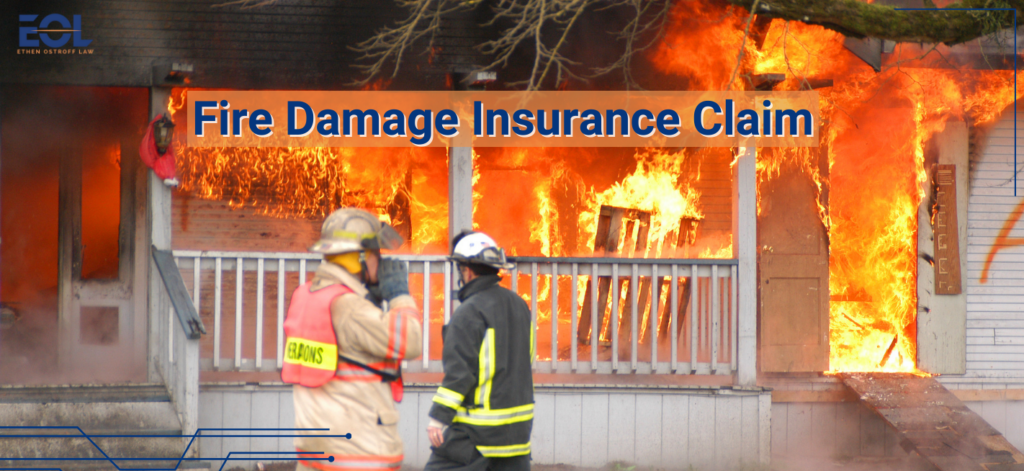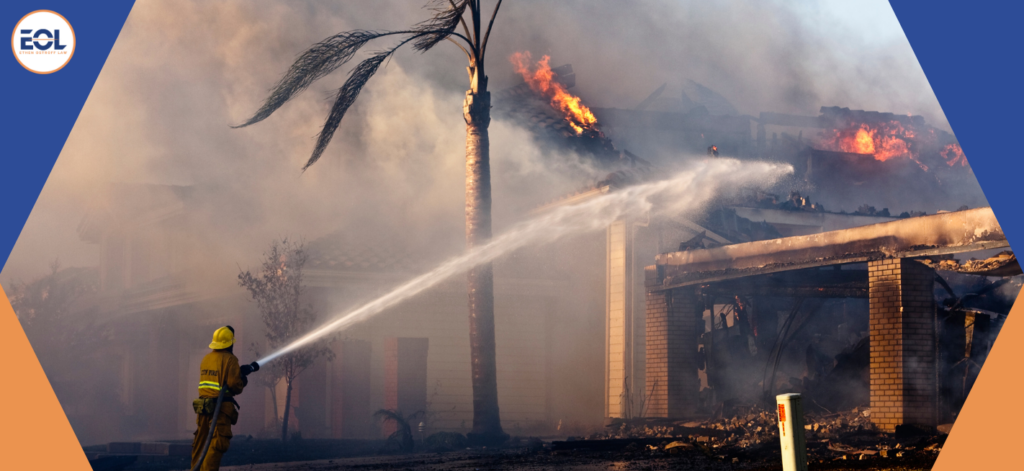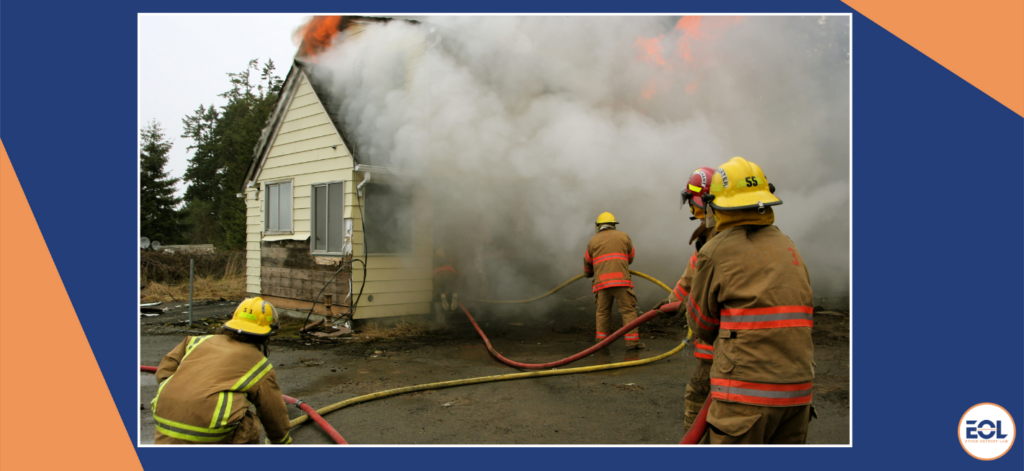Fire Damage Insurance Claim: Legal Assistance from Ethen Ostroff Law
When fires damage properties, it is a tough situation for owners. Whether it is a house, store, or any other place, the aftermath is catastrophic. From buildings getting damaged to losing personal stuff, it is devastating. This guide covers why fires happen, how they affect owners, the legal help available, and how Ethen Ostroff Law can guide you through a fire damage insurance claim. It is important to know your rights, whether you are dealing with damage firsthand or helping someone else.
Statistics on Property Damage from Fires
Here is a look at the latest statistics on property damage from fires in the US:
- According to the National Fire Protection Association, direct property damage from fires dropped by 28%. However, outside rubbish fires increased by 2%, and other fires rose by 14%.
- In 2021, there were about 1,353,500 fires in the US, resulting in around $15.96 billion in property damage, a decrease from the previous year’s $21.9 billion.
- In 2022, fires led to property losses of over $18 billion, up from the prior year.
- Reported direct property damage from fire ranged from $14.8 billion to $25.6 billion from 1977 to 2021.
- Statista said property losses due to fire ranged from $7,818 million to $9,467 million from 1990 to 2022.
- The Zebra noted that over a five-year period, house fires caused $6.9 billion in property damage.
- ValuePenguin found that wildfires caused over $18.7 billion in property damage, hitting California and Colorado the hardest.
These statistics show the significant impact of fires on property owners in the US, emphasizing the need for fire prevention measures and strong insurance coverage to lessen financial losses.
Common Causes of Fires
Fires stem from various causes, from accidents to deliberate acts. Recognizing these causes can help property owners prevent fires and identify potential risks. Common causes of property damage due to fire in the US include:
- Appliances and equipment: Faulty household appliances can start fires.
- Arson: Intentionally set fires by individuals seeking to harm property.
- Carelessness: Accidents result from careless actions like improper disposal of smoking materials.
- Chemicals and flammable materials: Mishandling of flammable substances can lead to fires and explosions.
- Cooking accidents: Unattended stoves and grease fires are common causes of residential fires.
- Electrical malfunctions: Faulty wiring and appliances can spark fires in homes and buildings.
- Heating equipment: Misuse of heating sources like furnaces and space heaters can lead to fires.
- Natural disasters: Wildfires and lightning strikes can cause widespread fire damage.
- Open flames: Candles and torches pose a fire risk if not handled carefully.
- Smoking materials: Discarded smoking materials can ignite fires, especially near combustible objects.

Common Types of Property Affected by Fire Damage
Various types of property can be affected by fire damage, including:
- Agricultural properties: Farms, barns, crops, and livestock can suffer substantial losses from fires, impacting farmers and agricultural communities.
- Commercial buildings: Offices, stores, and restaurants may experience significant damage, disrupting business operations and causing financial setbacks.
- Historical and cultural sites: Landmarks, monuments, and historic buildings are at risk of fire damage, endangering their preservation and cultural value.
- Industrial facilities: Manufacturing plants and warehouses may face production delays and environmental hazards due to fire damage.
- Landscapes and outdoor structures: Wildfires can destroy natural habitats, forests, and outdoor amenities like sheds and fences.
- Personal belongings: Furniture, electronics, and clothing can be severely damaged by fire, smoke, and heat.
- Public infrastructure: Bridges, roads, and utilities may suffer fire damage, posing safety risks and requiring costly repairs.
- Recreational areas: Parks and campgrounds can be affected by fires, impacting outdoor activities and tourism.
- Residential homes: Houses and apartments may sustain structural damage and loss of possessions due to fires.
- Vehicles: Cars, trucks, and motorcycles are vulnerable to fire damage, whether from accidents or deliberate acts.
Impact on Property Owners
The immediate and long-term impacts of fire damage on property owners can be profound, affecting various aspects of their lives, finances, and well-being.
Immediate Impact
- Displacement: Property owners may need temporary accommodation due to fire damage, like hotels or staying with others.
- Emotional distress: Fires can cause emotional trauma, grief, and shock as owners cope with loss and disruption.
- Financial burden: Dealing with fire damage brings immediate financial stress, including repair costs and replacing belongings.
- Loss of property: Fires often result in the loss of personal belongings, which can be emotionally and financially significant.
- Safety concerns: Safety is paramount, with risks like smoke inhalation and structural damage.
Long-Term Impact
- Insurance premiums: Owners may see insurance premiums rise after filing fire claims, adding to financial strain.
- Legal issues: Resolving claims and addressing liability involve legal complexities and potential disputes.
- Property devaluation: Fire damage can lower property values due to structural issues and lingering effects.
- Psychological effects: Owners may experience ongoing stress and anxiety after a fire, impacting their mental health.
- Rebuilding and recovery: Recovering from fire damage is a long process, requiring patience and support.
Fire Safety Tips
Prevention and awareness of potential fire hazards can help keep you and your property safe. Here are tips to keep fire at bay:
- Be cautious with candles: Use candles on stable surfaces away from flammable materials. Never leave them unattended.
- Create a fire escape plan: Plan multiple exit routes and practice regularly.
- Extinguish smoking materials: Always fully extinguish smoking materials in ashtrays.
- Install smoke alarms: Ensure alarms on each floor and in bedrooms, testing them often.
- Keep fire extinguishers accessible: Have them available and know how to use them.
- Keep flammable items away: Store flammable materials away from heat sources.
- Maintain heating equipment: Have heating systems inspected annually and keep flammable materials away.
- Practice electrical safety: Avoid overloading outlets and replace damaged cords.
- Properly store flammable materials: Keep liquids like gasoline and paint in well-ventilated areas.
- Use caution when cooking: Stay attentive while cooking and keep flammable items away.
Legal Remedies for Property Owners
Property owners affected by fire damage have legal options to recover and rebuild after fires. Among them are:
- Arson investigations: Property owners can cooperate with law enforcement to identify and apprehend arsonists, seeking criminal charges and civil compensation for damages.
- Breach of contract claims: Owners can pursue legal action against insurers for wrongfully denying or undervaluing a fire damage insurance claim, ensuring fair compensation as per insurance policies.
- Class action lawsuits: Multiple property owners can collectively sue liable parties for common fire damage causes, pooling resources for compensation and accountability.
- Negligence claims: Owners may file claims against parties whose negligence contributed to the fire, demonstrating breach of duty and foreseeable harm.
- Premises liability claims: Property managers or landlords can be held accountable for fire damage caused by hazardous premises under premises liability laws.
- Product liability claims: Owners can sue manufacturers for fire damage caused by defective products, holding them strictly liable for damages.
- Property damage insurance claim: Most owners have insurance covering fire damage, enabling claims for property and belonging losses, along with living expenses.

Possible Liable Parties
Determining who is liable for fire damage involves considering various parties:
- Arsonists: Those who deliberately set fires may be legally liable for damages.
- Contractors and subcontractors: Negligent construction work, especially with electrical or heating systems, could lead to liability.
- Government entities: Negligence in maintaining public infrastructure may contribute to liability.
- Manufacturers and distributors: Defective products or materials may make them liable under product liability laws.
- Neighbors and adjoining property owners: Negligence in maintaining adjacent properties could lead to liability if a fire spreads.
- Property owners: Failure to maintain property or comply with fire safety regulations may lead to liability.
- Tenants and occupants: Careless behavior, such as cooking accidents, may lead to liability.
- Utility companies: Negligence in maintaining utility infrastructure could result in liability for damages.
Seeking Compensation from Liable Parties
To seek compensation for fire damage, property owners should take the following steps:
- Identify the responsible parties: Determine who may be liable, such as negligent individuals, property owners, contractors, or manufacturers.
- Document evidence: Gather proof of damages, including photos, witness statements, and expert reports, to support your claim.
- Review contracts and insurance policies: Understand the coverage limits and obligations of responsible parties’ insurance policies.
- Notify the responsible parties: Inform them of your intent to seek compensation and keep records of all communication.
- Negotiate settlement: Try to reach an agreement through negotiation, mediation, or arbitration.
- File a lawsuit: If negotiations fail, consider filing a lawsuit based on legal claims like negligence or breach of contract.
- Litigation process: Work with legal counsel through stages like filing, discovery, motions, settlement talks, and trial.
- Trial and judgment: Present evidence and arguments in court, seeking damages for your losses.
- Enforce judgment: If successful, take steps to enforce the judgment and collect the awarded damages.
- Consult with legal counsel: Get guidance from experienced legal professionals specializing in property damage claims.
Following these steps with legal support can help property owners seek compensation and hold responsible parties accountable for fire damage.
Establishing Liability in Cases of Negligence or Wrongful Acts
Property owners must prove certain elements to establish liability in cases of negligence or wrongful acts regarding fire damage, including:
- Duty of care: Show that the responsible party owed a duty of care, such as maintaining safe premises or following fire safety regulations.
- Breach of duty: Demonstrate that the party breached this duty through negligent or wrongful actions, like faulty installations or manufacturing defects.
- Causation: Establish a direct link between breach of duty and the fire damage, often with expert testimony or forensic evidence.
- Comparative negligence: Consider if the property owner’s actions contributed to the damage, potentially affecting liability.
- Damages: Prove actual harm suffered, including property damage, loss of belongings, emotional distress, and economic losses.
- Foreseeability: Determine if the harm was foreseeable to the defendant, strengthening the case for liability.
- Legal standards: Use compliance with regulations and standards as evidence of the defendant’s duty of care or any violations as evidence of negligence.
Comparative Negligence and Shared Liability
In cases of fire damage involving multiple parties, the principles of comparative negligence and shared liability help determine responsibility for damages.
- Comparative negligence: This legal doctrine allocates responsibility for harm when multiple parties are at fault. It comes in two forms:
- Modified comparative negligence: Some states limit recovery if the plaintiff’s fault exceeds a certain threshold (often 50% or 51%). Recovery is reduced by the plaintiff’s percentage of fault.
- Pure comparative negligence: Each party is responsible for damages based on their percentage of fault, regardless of contribution.
- Shared Liability: When multiple parties share responsibility for fire damage, each bears liability proportionate to their fault. This means paying a portion of the total damages corresponding to their degree of negligence.

Government Assistance Programs
After a fire, government aid is available for recovery. Here are key assistance programs:
Federal Emergency Management Agency
- Individual Assistance: Financial aid for individuals and households affected by disasters.
- Public Assistance: Funding for government and nonprofits to aid in recovery.
- Small Business Administration: Low-interest loans for property repair or replacement.
- Department of Housing and Urban Development: Grants for housing rehabilitation and community development.
- Department of Agriculture: Grants, loans, and technical assistance for rural fire-affected communities.
- Department of Health and Human Services: Emergency medical aid and counseling services.
- Department of Labor:Disaster Unemployment Assistance for affected workers.
- State and local programs: Additional relief programs and services tailored to regional needs.
Filing Fire Damage Insurance Claim
Filing a fire damage insurance claim for fire damage is crucial for property owners’ recovery. Here is a guide to navigating the process effectively:
- Safety first: Ensure safety before entering the property post-fire.
- Contact your insurance company: Notify them promptly and provide fire details.
- Review your policy: Understand coverage, exclusions, and filing requirements.
- Document the damage: Take photos or videos of damaged areas and belongings.
- Make temporary repairs: Prevent further damage and keep records of expenses.
- Inventory your losses: List damaged items with descriptions and proof of ownership.
- Cooperate with the claims adjuster: Assist with their assessment and provide the requested information.
- Obtain estimates: Get repair or replacement estimates and submit them to your insurer.
- Keep detailed records: Document all communications and interactions with your insurer.
- Review the settlement offer: Carefully assess the offer and consult if necessary.
- Appeal if necessary: Challenge inadequate settlements by providing additional evidence.
- Consider legal options: Seek legal advice if disputes arise with your insurer.
Common Challenges and Pitfalls in Insurance Claims
Navigating a property damage insurance claim, especially for fire damage, can be complex. Here are common challenges property owners may face:
- Claims denials: Insurance companies may deny a fire damage insurance claim, requiring appeals or legal action.
- Complex claims process: The process can be overwhelming, requiring assistance from professionals like public adjusters or attorneys.
- Delayed reporting: Timely reporting is crucial to avoid claim processing delays or denials.
- Disputes over coverage: Coverage disputes may arise, necessitating negotiation or legal intervention.
- Emotional stress: Dealing with fire damage and claims can lead to emotional strain, requiring support from loved ones or professionals.
- Incomplete documentation: Insufficient documentation can hinder claim assessment, emphasizing the need for thorough records.
- Low settlement offers: Offers may be inadequate, requiring careful review and potentially consulting experts.
- Policy exclusions: Policy exclusions may limit coverage, highlighting the importance of understanding policy terms.
- Underinsurance: Discovering underinsurance may lead to unexpected out-of-pocket expenses.
- Unfair claims practices: Insurance companies may engage in unfair practices, prompting action to uphold rights under insurance laws.
Compensation in Fire Damage Claims
In fire damage claims, compensation typically covers various losses incurred by property owners. Here are the types of compensation commonly sought:
- Additional living expenses: Covers temporary housing, meals, and transportation while displaced.
- Debris removal and cleanup: Includes expenses for removing and disposing of damaged materials.
- Emergency repairs: Reimburses the cost of securing the property and preventing further damage.
- Legal fees and costs: Covers attorney’s fees and legal expenses incurred in pursuing the claim.
- Loss of use: Compensates for the inability to use the property during repair or restoration.
- Personal injury or wrongful death: Includes medical expenses, lost wages, and pain and suffering.
- Property damage: Covers repair or replacement of damaged structures and belongings.
- Punitive damages: Awarded in cases of gross negligence or intentional wrongdoing to punish and deter.
Importance of a Personal Injury Lawyer in Fire Damage Claims
The role of a personal injury lawyer is critical in fire damage cases for several reasons:
- Dealing with insurance companies: Personal injury lawyers handle communications with insurance companies, protecting your rights, and ensuring fair compensation according to your policy.
- Investigation: They conduct thorough investigations into the fire’s cause, determining liability by collecting evidence, interviewing witnesses, and collaborating with experts.
- Legal guidance: They help you understand your rights and navigate the legal process effectively by offering expert advice on personal injury law.
- Litigation: If settlements are not reached, they represent you in court, presenting a compelling case to pursue justice and fair compensation.
- Maximizing compensation: As skilled negotiators, they advocate for maximum compensation and assess all damages to ensure you receive fair restitution.
How Ethen Ostroff Law Can Assist You
Navigating the aftermath of a fire often means tackling different aspects tied to a fire damage claim. Property owners encounter hurdles, especially in determining who is liable for fire damage. Seeking compensation usually entails filing a fire claim or fire insurance claim with the insurer. Hence, it is crucial to pinpoint the liable parties and gather the required documentation to bolster the fire damage claim. However, the legal process can be daunting, from understanding insurance policies to seeking compensation from liable parties. Property owners can secure the compensation they deserve to rebuild and move forward with the right guidance and representation.
At Ethen Ostroff Law, we understand the difficulties they faced in the aftermath of a fire. Our attorneys provide personalized support and aggressive advocacy to ensure our clients receive the maximum compensation available.
What are you waiting for? Contact Ethen Ostroff Law now at 610-510-8883 ( by calling this number, you consent to receive SMS updates from Ethen Ostroff Law) or Submit Form to get free consultation.


